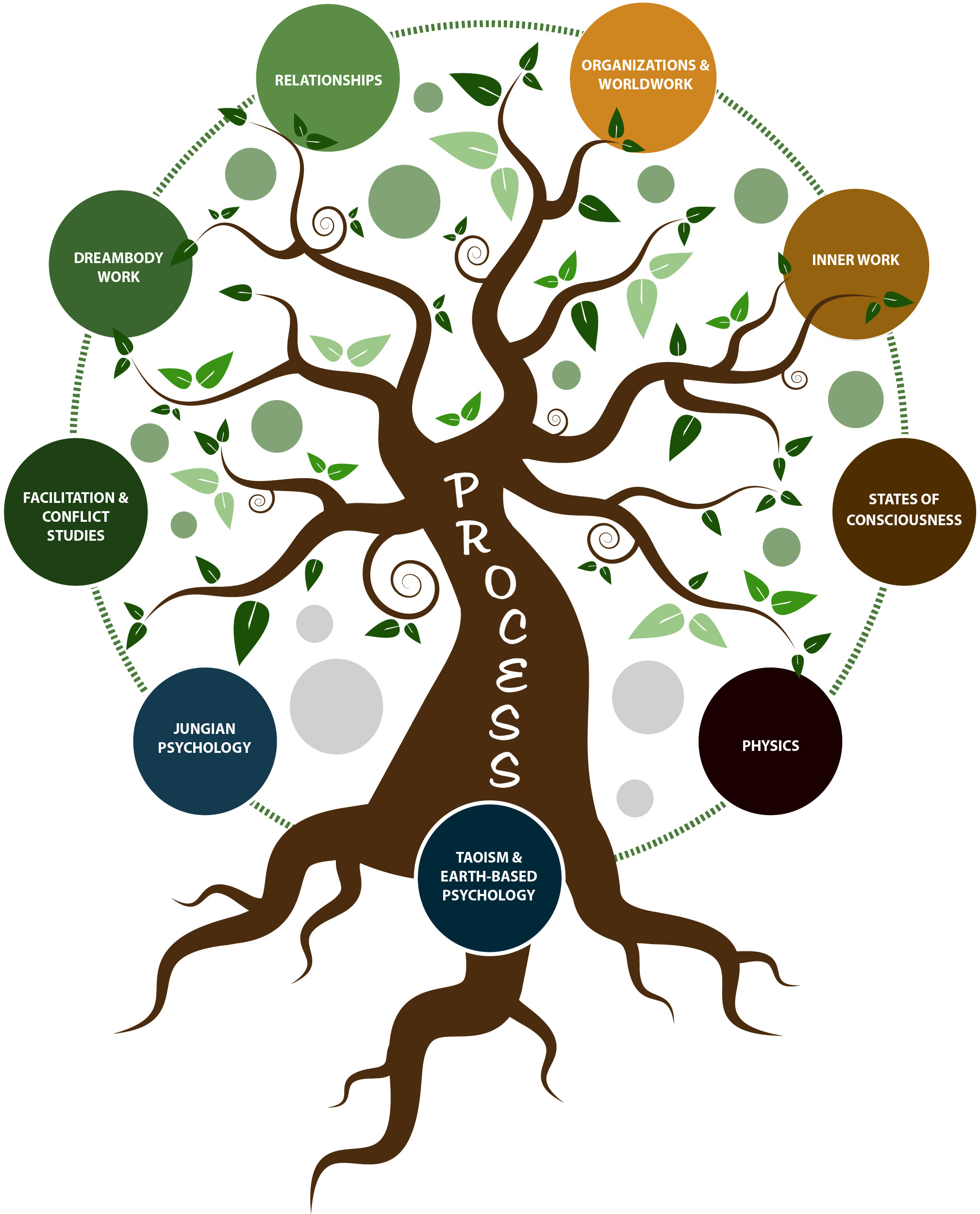Process Work is difficult to define.
There’s a number of reasons for this, some of which I mention in the first part of this series: it’s phenomenological, subjective, a heuristic or practice, transdisciplinary and full of it’s own special jargon.
Because English is a noun-focused language it emphasizes objects, people and places. Process Work resists being “thing-ified,” rather, it lends itself to description more than definition. Thus, the first challenge is one of vocabulary. If we put aside the normalcy that with all disciplines there is jargon – which for those on the outside is cumbersome. What makes PW especially difficult is that the vocabulary shrouding it is phenomenological. This means that the words we use to describe it are not really things either but rather experiences.
OK, with these caveats stated, let’s unpack the vocabulary: process and work. The pre-conceived meaning of the word process can cause some confusion. In common speech, process points something algorithmic, which typically involves instructions and relationship blueprints for moving – or perhaps transforming something – from A to Z. While there’s some crossover, algorithm is too small a word. Rather, process points to unfolding, changing, experiential phenomena. Process can be compared to what traditional Taoists call, The Way (which hearkens to some implicit assumptions about Process Work – more on that soon). The language that supports Process Work then, is subjective, invoking relationality and dimensionality, world-opening and conducive often to physical unfoldment. And the word work, points to investigation.
In summation:
Process Work is a practice, not a thing.
Next, assumptions.
Assumptions are like flagposts that direct thought-traffic upstream. Without their validation, we lack agency and run the risk of blindly following. They frame and channel our point of view and can simplify complex reality. For example, say I’m using mathematics to model a river. I can make an assumption that in the x-direction, there is linear flow, in y and z, flow is negligible and doesn’t change in time. If I know when these conditions are acceptable, I can reduce, without too much error, a 3D partial differential equation into an algebraic equation. Those assumptions transform something a high-level math or engineering student would labor over, into something an 8th grade student could understand. Reality is complicated. In truth, there is flow in all directions and it changes over time. But the approximation is sufficient.
It goes both ways: assumptions can narrow and crop reality – reducing reality’s complexity – they can also open worlds.
Again, in the field of mathematics, by obeying established laws imaginary numbers were invented to allow taking the square root of negative numbers. An operation that later enabled the creation of quantum mechanics.
Because assumptions frame, channel and open understanding, in any theoretical framework, research question or model, it’s critical to be explicit about them.
Below I articulate some of the underlying assumptions that feed into the practice of Process Work:

1 - Change is fundamental, it is exalted and at a minimum it is respected
The first part of this assumption is universally recognized. From science, religion, indigenous traditions, nature and phenomenology itself: as it relates to the big bang and the creation of chaos and time, all agree on change.
The second part is more complicated. It points to a sort of ethical, awareness-informed, next step from the premise of change. To exalt, or at least respect this premise, is to yield to the way of it. More than that, it is to face it and acknowledge it’s isness. To be in relationship with it.
2 - The Process of change is intelligently evolving and trustworthy.
It’s not hard to get behind the first part. Evolution presides over more complex and diverse combinations of life – oxygen to bacteria, to plants, to beasts – life moves towards greater complexity and concomitantly, it would seem – as an interconnected whole.
The second part, trust, is a leap for most people. Trust is a choice and intrinsically it is based on imperfect information and invites us into relationship. The relationship in question here is the one you have with change.
Do you trust Process?
I view trust as the work to rise above the knee-jerk response to fear of the unknown. Most of us inherit and unconsciously reinforce a fear response. So many reasons for this: history, systems of oppression and trauma. It’s no surprise that the work of trusting feels like going upstream to big rivers.
When it comes to trusting change, there is a lot of room for healthy pushback and debate. Note” trusting process is not the same as viewing everything as meaningful or good. Nor does it mean bypassing intrinsically “bad things.” Many of us get caught-up weaponizing narratives in service to a “Pollyanna” interpretation of trust.
For example believing that someone gets cancer because they’re an angry person. Trusting process does not put us at fault for the random and terrible shit that happens. Nor does it mean we’ll never get cancer. Bad things happen. Good people suffer and it’s not necessarily anyone’s fault.
For me, it’s pretty simple. It comes down to: honor what is. Change is. Awareness is. Following my Process has led me to truth, truth leads me to trust.
3 - Awareness is fundamental to experience and attention is fundamental to following Process
Awareness is our relationality-entry-point into all things – it’s like breathing – always there. Presence is a slightly more nuanced form of awareness. It directs. Presence indicates a capacity to be with, to feel, to intentionally place attention on.
I may be aware of a symptom somewhere in my consciousness, I may be able to feel an energy or dynamic that wants attention. That level of awareness isn’t helpful unless I place my attention on it, giving it space. Presence then, like attention, is a skill, a capacity and a relationship. My attention and my attention on attention, shapes my experience. If I want to relate to and follow my process, I have to be curious, I slow down, feel, give space to what I notice.
4 - Relationality to the movement of life grows when we rest our attention on it.
There are two parts to this assumption. The first is relationality, the second is how relationality grows when we attend to it.
Speaking from the US cultural lens, where there is a sky-rocketing epidemic of attention deficit disorders linked to the meteoric rise of the internet, social media and the attention economy. Process Work is an antidote – as we learn to place our attention on a generative process – we grow in awareness and curiosity.
Rather than giving it away, we diversify the landscape of thinking. As with any practice, we get better by doing.
5 - Process Work acknowledges roles in a deeply democratic way
Arne Mindell defines roles as: “A cultural rank, position or viewpoint that depends on time and place.” They represent different perspectives and are brought to bear in groups and through relationality. To relate to them in a deeply democratic way is to acknowledge their existence.
Roles populate the field and exert their influence akin to archetypes, they may take on the voice of more than one impactful energy and are fluid. They can appear as aspects of individual self-concept, culture and historical records.
For example: I may unconsciously pick up roles about women and power in society. This role in me – internalized patriarchy – may look like me downplaying my intelligence in a group of strange men.
I may not like this, it may make me feel inauthentic or disempowered. That’s me beginning to turn towards the role. My awareness of the role I’ve unconsciously picked up is the first step to relate democratically to it. I can then acknowledge that the role has kept me safe from standing out, safe from ridicule and kept me likable in certain situations. All good things for a human with a danger-informed nervous system. As I listen to the feedback, relate to the role democratically, I can view it with some space and perspective. It shows me the ways I give my power away – this inspires discernment and illuminates a way to relate to my power safely.
Related Posts
January 1, 2024
Process Work Origins: Part One
When you are alone for days or weeks at a time, you eventually become drawn to…


